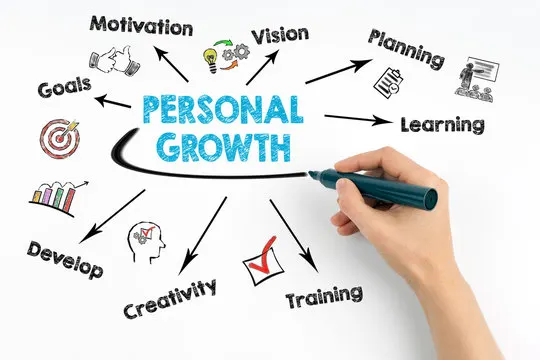Self-Development Goals: Achieve Your Full Potential
Have you ever wondered what separates those who excel in life from those who merely get by? What drives some people to live with passion, purpose, and success while others feel stuck in the same routine? The answer often lies in their self-development goals. These “best self-improvement practices for personal growth act as a guiding light, helping you grow, adapt, and succeed in every area of life.
As Mahatma Gandhi famously said, “The best way to find yourself is to lose yourself in the service of others.” These “Tips for creating effective self-development plans” emphasize the transformative power of personal growth—when you focus on improving yourself, you not only enrich your life but also impact those around you.
But what exactly are self-development goals, and how can you set them effectively? Let’s dive deep into these “Examples of self-development goals for professionals and understanding their significance, and explore these actionable steps to create a fulfilling personal development journey. Whether you aim to enhance your career, improve relationships, or find inner peace, these “Steps to Achieve Personal Development Goals can transform your life.
What Are Self-Development Goals?
Self-development goals are targets you set for yourself to improve specific aspects of your life. These goals help you cultivate essential skills, build better habits, and achieve a higher level of self-awareness. They focus on your personal and professional growth, enabling you to unlock your full potential.
The beauty of self-improvement goals lies in their versatility. They can range from learning a new language or mastering public speaking to improving emotional intelligence or building physical fitness. These personal growth objectives not only shape your future but also help you live a more meaningful and intentional life.
As Aristotle wisely noted, “We are what we repeatedly do. Excellence, then, is not an act but a habit.” By setting and pursuing these goals, you create habits that lead to a fulfilling life.
Why Are Self-Development Goals Important?
If you’re wondering why you should prioritize self-improvement goals, here are some compelling reasons:
- Clarity and Direction: Setting goals gives you a clear sense of purpose and direction.
- Personal Growth: Working on these goals ensures continuous improvement in all aspects of your life.
- Increased Confidence: Achieving milestones boosts your self-esteem and confidence.
- Resilience: The journey of self-improvement strengthens your ability to adapt to challenges.
- Happiness and Fulfillment: Pursuing meaningful goals aligns with your values, bringing joy and satisfaction.
As Eleanor Roosevelt said, “The future belongs to those who believe in the beauty of their dreams.” Your goals are the roadmap to turning those dreams into reality.
The Pillars of Self-Development Goals
To create well-rounded self-growth goals, focus on these key areas:
1. Mental Growth
- Practice mindfulness to stay present and reduce stress.
- Engage in lifelong learning through books, courses, and seminars.
- Set goals to overcome limiting beliefs and negative thought patterns.
These are the key pillars of self-growth tips. Albert Einstein once remarked, “Once you stop learning, you start dying.” Mental growth ensures that you remain curious, adaptable, and open to new possibilities.
2. Emotional Growth
- Develop emotional intelligence by understanding and managing your emotions.
- Strengthen your relationships by improving empathy and communication skills.
- Learn to forgive yourself and others for emotional healing.
As Brené Brown wisely stated, “Owning our story can be hard but not nearly as difficult as spending our lives running from it.” Emotional growth helps you embrace your vulnerabilities and grow stronger.
3. Physical Growth
- Create fitness goals, such as exercising regularly or eating a balanced diet.
- Focus on improving sleep quality for overall health and productivity.
- Incorporate physical challenges to build discipline and resilience.
Julius Erving’s words resonate here: “Being a professional is doing the things you love to do on the days you don’t feel like doing them.” Physical growth demands consistency and discipline.
4. Professional Growth
- Set career development goals, like learning new skills or networking.
- Strive for work-life balance to maintain overall well-being.
- Seek mentorship and constructive feedback for continuous improvement.
Steve Jobs said it best: “The only way to do great work is to love what you do.” Professional growth is about aligning your work with your passions.
5. Spiritual Growth
- Reflect on your values and align your actions with them.
- Practice gratitude to cultivate a positive outlook.
- Explore meditation or other spiritual practices to connect with your inner self.
Rumi’s timeless wisdom reminds us, “What you seek is seeking you.” Spiritual growth helps you find peace and purpose in your journey. These are achievable self-development steps that will help you attain your self-improvement goals, which are essential for becoming a successful person.
How to Set Effective Self-Development Goals
Setting effective self-development goals involves more than just writing down aspirations. Use these steps to ensure your goals are achievable and impactful:
- Self-Reflection: Start by identifying areas in your life that need improvement.
- Be Specific: Avoid vague goals. For instance, instead of saying, “I want to be fit,” aim for “I will work out three times a week.”
- Set Measurable Goals: Use metrics to track your progress. For example, “Read 20 pages a day.”
- Prioritize: Focus on one or two goals at a time to avoid overwhelm.
- Create a Timeline: Set deadlines to keep yourself accountable.
- Stay Flexible: Life is unpredictable, so adapt your goals as needed.
- Celebrate Milestones: Reward yourself for small wins to stay motivated.
As Tony Robbins puts it, “Setting goals is the first step in turning the invisible into the visible.”
Examples of Self-Development Goals
Here are some examples to inspire your personal growth journey:
- Mental Goals:
- Read one self-help book per month.
- Practice gratitude journaling daily.
- Emotional Goals:
- Resolve a conflict with a loved one.
- Attend a workshop on effective communication.
- Physical Goals:
- Run a 5K marathon.
- Replace sugary snacks with healthy alternatives.
- Professional Goals:
- Complete an online certification relevant to your field.
- Build a LinkedIn network of 500+ professionals.
- Spiritual Goals:
- Meditate for 10 minutes daily.
- Volunteer for a cause that aligns with your values.
Overcoming Challenges in Pursuing Self-Development Goals
Every journey comes with hurdles, and pursuing self-development goals is no exception. Here’s how you can tackle common challenges:
- Procrastination: Break goals into smaller tasks and set deadlines.
- Fear of Failure: Embrace failure as a learning opportunity.
- Lack of Motivation: Surround yourself with inspiring people and resources.
- Time Constraints: Prioritize your schedule and eliminate distractions.
- Imposter Syndrome: Remind yourself of your strengths and past achievements.
As Nelson Mandela said, “I never lose. I either win or learn.” Challenges are stepping stones to greatness.
Tools and Resources to Support Your Journey
Leveraging the right tools can make a significant difference in achieving your self-development goals:
- Books: “Atomic Habits” by James Clear and “The 7 Habits of Highly Effective People” by Stephen Covey.
- Apps: Headspace for mindfulness, Trello for goal tracking, and MyFitnessPal for health.
- Courses: Platforms like Coursera, Udemy, and Skillshare offer valuable learning resources.
- Communities: Join groups or forums aligned with your goals for support and accountability.
Staying Committed to Self-Development Goals
Sticking to your self-development goals requires consistency and dedication. Here are some tips to maintain momentum:
- Review Your Progress: Regularly evaluate what’s working and what’s not.
- Stay Inspired: Listen to motivational podcasts or watch TED Talks.
- Seek Accountability: Share your goals with a trusted friend or mentor.
- Visualize Success: Picture the benefits of achieving your goals.
As Zig Ziglar famously said, “You don’t have to be great to start, but you have to start to be great.”
Conclusion: Your Journey Starts Now
The path to personal growth begins with setting meaningful self-development goals. By identifying areas for improvement, creating actionable plans, and staying committed, you can transform your life in ways you’ve never imagined. Remember, the journey is just as important as the destination, so embrace every step with positivity and determination.
Are you ready to take charge of your future? Start today by setting your first self-development goal, and watch yourself grow into the best version of you.
At SV Enlightment, we encourage you to use these self-improvement goals to develop a growth mindset and unlock your true potential.Your future is entirely in your hands. Only you have the power to make the changes needed to shape the life you desire. No one else can do it for you! If you don’t take action, you risk never becoming the person you’re capable of being. Start implementing these actionable steps today, and take control of your journey to become all that you wish to be. Your transformation starts now!








